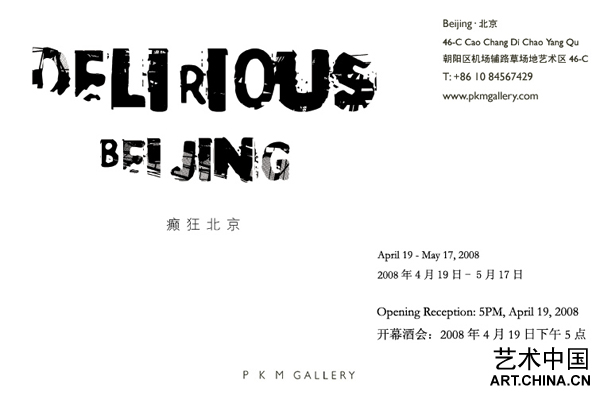|

癫狂北京
北京朴敬美画廊
2008年4月19日—5月17日
开幕酒会: 下午5点,2008年4月19
策展人:Philip Tinari
2008年初,北京看起来更像一座深陷于时空错位的未来主义城市。时间在城中各主要场所放置的时钟上以天数、小时、分秒的单位不断流逝,终点就是“八”星报喜的那一刻(2008年8月8日晚8点),北京奥运会开幕——我们理应相信——一切都将改变。这种狂热的等待引出了一系列心理和审美问题,至今仍然没人能为其提供一个明确答案。难道北京真如有些人断言一般,将成为二十世纪初乌托邦现代主义最后真正的(尽管扭曲)的继承者?经过漫长等待终于到来的这次华丽登场对全球美学,政治,甚至是道德观有没有影响?如果有的话,会给以上领域带来什么样的变化?雷姆·库哈斯——他本人也是如今北京最受瞩目的建筑项目(央视新楼)的设计师——在他的成名作中对“极端曼哈顿主义”感受力做了明确阐述。与此相反,《癫狂北京》希望找到一种具体的方式回应这一独特的处境。
《癫狂北京》参展艺术家所属世代、地域和地位都有很大不同,将他们联系起来的是在目前处境下共有的紧迫感。展览以Ryan Gander的《访谈》开始,作品记录了库哈斯和策展人Hans-Ulrich Obrist的一段关于采访本身性质的对话。Sarah Morris的绘画作品《环路》和艾未未的一百小时录像《四环内的每一条街道》紧随其后,接着是一大批像李姝睿、刘窗、赵赵、王郁洋Rutherford Chang和Jordan Wolfson等年轻艺术家的新作展示。老作品有赵刚八十年代早期的城市绘画、刘安平的记录他九十年代城市干预的拼贴画和绘画、以及更多正处于职业生涯中期艺术家像聂幕和艾格林的作品。
《癫狂北京》是北京朴敬美画廊自2006年开幕以来首次聚焦中国当代艺术的展览。
Philip Tinari(田霏宇)现居北京,身兼作家和策展人。他现主持话坊出版编辑工作室、同时也是巴塞尔艺博会中国顾问和Artforum网中国版的主编。此外他还为博物馆图录和一些出版物例如Artforum和Parkett做固定撰稿人,在纽约的古根海姆美术馆和华美协进社讲授中国当代艺术。《癫狂北京》是他在北京自2003年以来策划的首场展览。
北京朴敬美画廊 北京朝阳区草场地46号C 邮编-100015
#46-C CAO CHANG DI, CHAOYANG QU, BEIJING 100015, CHINA
T. +86 10 8456 7429 F. +86 10 8456 7482 WWW. PKMGALLERY.COM
PKM Gallery Beijing
April 19 – May 17 2008
Curated by Philip Tinari
Opening Reception: 5:00PM, April 19, 2008
Beijing in early 2008 is a city mired in a deeply anachronistic futurism. Clocks placed in major sites around town tick off the days, hours, and seconds until the eights align (August 8, 2008, 8:00 p.m.), the Olympics begin, and—we are to believe—everything is changed. This state of frenzied waiting raises a set of psychological and aesthetic questions that have not been adequately answered: Is Beijing, as some claim, the last true (albeit distorted) heir to the modernist utopianism of the early twentieth century? How does the emergence to be marked by this long-awaited moment change global notions of aesthetics, politics, and even morality, if at all? In contraposition to the “radical Manhattanist” sensibility articulated in the book that first brought fame to Rem Koolhaas—himself the designer of the most notable architectural project in the Beijing of this moment—Delirious Beijing looks to locate a specific way of reacting to this distinct set of conditions.
Delirious Beijing juxtaposes works by artists from a range of generations, geographies, and positions, united by a shared sense of the urgency of this current situation. Beginning with Ryan Gander’s Ghostwriter Subtext, a video that presents Koolhaas and curator Hans-Ulrich Obrist engaged in a dialogue about the nature of the interview itself, the show moves through works like Sarah Morris’s Ring Road paintings and Ai Weiwei’s hundred-hour video Every Street Inside the Fourth Ring Road, toward a broad range of new works by younger artists including Li Shurui, Liu Chuang, Zhao Zhao, Wang Yuyang, Rutherford Chang and Jordan Wolfson. Older pieces such as Zhao Gang’s urban paintings of the early 1980s and Liu Anping’s collages and paintings documenting his urban interventions of the 1990s complement more recent work by mid-career artists such as Nie Mu and Ai Gelin.
Philip Tinari is a writer and curator based in Beijing. He directs the editorial and publishing studio Office for Discourse Engineering and serves as China Advisor to Art Basel and executive editor of artforum.com.cn. He is a regular contributor to museum catalogues and publications including Artforum and Parkett, and has lectured on Chinese contemporary art at the Guggenheim and China Institute. Delirious Beijing is the first exhibition he has curated in Beijing since 2003. |

